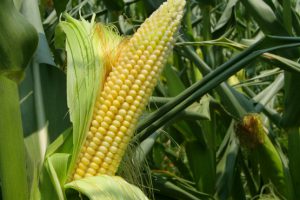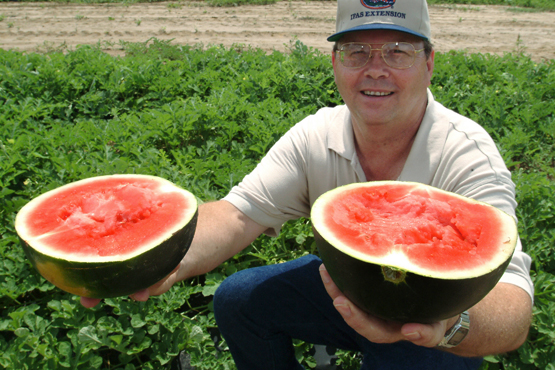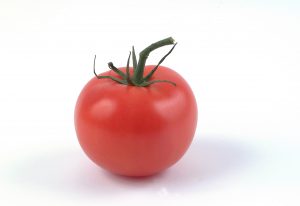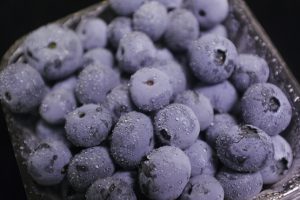
by Dorothy C. Lee | Aug 19, 2020
Strictly speaking, corn is not a vegetable, but a grain native to the Americas. The sweet, or sugar, corn we enjoy today is a mutation of Indian field corn. Nothing is as American as corn-on-the-cob, and sweet corn has plenty of complex carbohydrates and fiber.
Use & Preparation
Boil: Remove husks and cook 8 to 10 minutes in rapidly boiling unsalted water.

Sweet corn is a favorite among home gardeners. As long as the space is available, it’s not difficult to grow. Photo source: UF/IFAS
Microwave (on High):
1 ear – 3 to 5 minutes
2 ears – 4 to 9 minutes
3 ears – 9 to 12 minutes
4 ears – 12 to 17 minutes.
Rinse and dry corn with husk pulled back. Pull husks up to cover corn, then rinse with husks on. Do not dry. Arrange like spokes on paper towel; cover with wax paper; cook. Let corn stand for 5 to 10 minutes after cooking. Carefully remove husks, using heavy toweling to avoid burns.
Selection
Look for healthy green husks, plump kernels, and silks that are moist and light golden, not brown and brittle.
Storage
Use fresh corn as soon as possible. Refrigerate unhusked in plastic bag for up to 2 days.
Herbed Corn on the Cob
6 ears fresh corn
2 tablespoons margarine
1 teaspoon dried salad herbs (available in stores, optional)
Prepare corn for microwaving according to directions above. Microwave on high for 16 to 18 minutes, turning corn around/over after about 8 minutes. Let stand 5 minutes, then remove husks. Combine softened margarine and salad herbs. Spread 1 teaspoon of margarine mixture over each ear of corn.
Corn Chowder
1 tablespoon margarine, plus
3 tablespoons margarine
1 onion, chopped fine
4 medium potatoes, peeled and diced
3 cups water
2 cups corn kernels
3 cups milk
Salt and pepper
Brown onion in margarine, cook for 5 minutes. Add potatoes and water, cover and cook until potatoes are just tender. Add corn and milk and cook 5 minutes more. Before serving, add the margarine and salt and pepper to taste, and reheat.
Nutrition Information
Low fat & cholesterol free. High in fiber. Very low in sodium. Good source of vitamin C and carbohydrates.
Available Fresh
June – September
To learn about fresh Florida corn, please read our fact sheet: Panhandle Produce_Corn.
For more delicious produce preparation tips, please visit: http://www.panhandleproducepointers.com.

by Dorothy C. Lee | Aug 4, 2020
The taste and fragrance of a cool, juicy slice of fresh melon in the summer just can’t be beat. Melons have been a favorite fruit for many centuries. They appear in Egyptian tomb paintings dated to 2400 B.C., and they are mentioned in the writings of the early Greeks and Romans. Mark Twain called watermelon “the food that angels eat.”
Uses & Preparation
Watermelon, honeydew, and cantaloupe are excellent cut up in salads, as a dessert, or alone as a cool, refreshing snack anytime. To save space and cooling time in the refrigerator, cut up the melon and cover tightly with plastic wrap.

UF/IFAS Photo
Selection
Thumping watermelon to judge ripeness is not always accurate, because you can’t tell if it is ripe or overripe. Instead, look for a well-proportioned melon with full ends, a dull outer skin, and the bottom a yellowish color, or turning from white to pale green.
Cantaloupe should have no sign of a stem, be nicely rounded, and the netting should be evenly distributed. Golden-colored melons with a mild melon odor are the peak of ripeness, while green ones will ripen in a few days if kept at room temperature.
A ripe honeydew melon has a creamy yellow rind that is soft and velvety. The best – tasting honeydew smells slightly fruity. Hold a honeydew at room temperature for a few days for even tastier fruit.
Melon Salad
Arrange balls or slices of watermelon, cantaloupe, or honeydew melon, alone or in combination, on lettuce. Serve with French dressing. Diced apples, diced pears, nuts, and chopped celery may be added for variety.
Chicken & Watermelon Salad
5 chicken breast, boned, skinned, cooked and cubed
3 cups watermelon, cubed
3 cups pears, cored and cubed
1/2 pound sliced mushrooms
1/2 pint low-calorie Italian dressing
Combine all ingredients, toss gently. Refrigerate on hour, stirring occasionally. Serve on a bed of lettuce.
Nutrition Information
Low in sodium. Low in calories. Good source of vitamin A.
Available Fresh
June – August
To learn about fresh Florida melons, please read our fact sheet: Panhandle Produce Pointers – Melons
For more delicious produce preparation tips, please visit: http://www.panhandleproducepointers.com.

by Dorothy C. Lee | Jun 11, 2020
The classic succulent vegetable of summer is ripe for your salads, sandwiches and salsa. Tomatoes can be used many ways to make good food with good nutrition.

Tomatoes are one of the most popular vegetables among home gardeners. Excellent source of vitamins C and A. (Photo source: UF/IFAS file photo)
Uses & Preparation
Unripe tomatoes take 3 to 4 days to ripen. Use ripe tomatoes within a day or two. For best flavor, do not refrigerate. Slice, wedge or dice; sprinkle with a fresh herb, drizzle with olive oil and serve. Wonderful with slices of avocado, but then skip the olive oil. Stuff with seafood, chicken, or pasta salad. Cherry tomatoes make a delicious, nutritious snack by themselves.
Selection
Ripe tomatoes will give slightly to gentle pressure.
Storage
Store unwashed at room temperature and out of direct sunlight.
Tomato, Zucchini & Onion
2 cups sliced tomato
2 cups sliced zucchini
2 cups sliced onion
1 1/2 teaspoon Italian herb seasoning
1/2 teaspoon salt (optional)
dash of pepper
Preheat oven to 350 degrees. Layer onion, tomato, and zucchini in a 2-quart casserole dish that has been sprayed with a non-stick coating. Sprinkle each layer with seasonings. Bake for 30-45 minutes, depending on how soft you want the vegetables.
Basil Tomatoes
The addition of basil gives an excellent flavor to fresh tomatoes.
2 cups tomatoes, diced or sliced
1 teaspoon dried basil
1 teaspoon chopped garlic
1/2 teaspoon salt (optional)
1/8 teaspoon pepper
Mix ingredient and let sit at room temperature at least 1 hour. Serve plain or on a lettuce leaf.
Nutrition Information
Excellent source of vitamin C. Good source of vitamin A.
Available Fresh
June – July & September – October
To learn about fresh Florida tomatoes, please read our fact sheet: Panhandle Produce Pointers – Tomatoes
For more delicious produce preparation tips, please visit: http://www.panhandleproducepointers.com.
For a quick and easy salsa, please visit: Easy Salsa
UF/IFAS Extension is an Equal Opportunity Institution.

by Dorothy C. Lee | May 11, 2020
Once known as star berries because of the pointy flower calyxes on top, blueberries have grown wild in North America for thousands of years. They were a staple among Native Americans, who dried and smoked the berries, and pounded them into venison to flavor the meat.

Berries such as blueberries are rich in vitamin, minerals, and antioxidants and can be delicious additions to yogurt, salads, and smoothies. (Photo source: UF/IFAS file photo)
Uses & Preparation
Wash blueberries just before using. Add to yogurt or cottage cheese or any fruit and mild cheese platter. For color and great taste, add to salads; or sweeten pancakes, cakes, and muffins.
Selection
Look for firm, dry, plump, smooth-skinned berries with a light grayish bloom. Ripe berries should be deep-purple blue to blue-black.
Storage
Cover and refrigerate fresh berries for up to 10 days. Blueberries are easily frozen for later use. Freeze unwashed blueberries in airtight, resealable plastic bags. If thawed, keep refrigerated and use within 3 days.
Blueberry Pancake Stacks
Vegetable Oil for cooking
1 cup milk
1 tablespoon vegetable oil
1 egg
1 cup all-purpose flour
1/2 teaspoons baking powder
1 teaspoon salt
1 cup fresh blueberries
Dash of nutmeg
In a mixing bowl, stir together the milk, oil, and egg. In a separate bowl, combine the flour, sugar, baking powder, salt and nutmeg. Add dry ingredients to the milk, and stir just until mixed (batter should be slightly lumpy). Gently fold in the berries. Spoon the batter onto a griddle or pan greased with vegetable oil and heated to medium-hot (dollops should be about the size of a silver dollar). Let the batter cook until the tops of the pancakes begin to bubble, then flip and cook until done. Stack and serve immediately with softened margarine and warm syrup. Makes about eighteen 2 1/2″ pancakes.
Blueberry Syrup
Combine 1 pint of blueberries and 1 cup of maple syrup in a saucepan. Heat to boiling, then lower the heat and simmer until most of the fruit has burst. Remove from heat and use a fork to mash the berries. The syrup will thicken as it cools. Store in the refrigerator for up to 2 days.
Nutrition Information: Good source of vitamin C. High in fiber. Low in calories.
Available Fresh: April – June
To learn about fresh Florida strawberries, please read our fact sheet: Panhandle Produce Pointers – Blueberries.
.For more delicious produce preparation tips, please visit: http://www.panhandleproducepointers.com.
UF/IFAS Extension is an Equal Opportunity Institution.

by Dorothy C. Lee | Apr 16, 2020
Even during our ‘Safer at Home’ orders, we must use our vehicle if we are essential workers or run necessary errands. Learn safe car cleaning practices from UF IFAS Extension Escambia County to help minimize your risks during local travel.
Disinfect Your Car
During this time of extreme sanitizing don’t forget your car.
- Cleaning the steering wheel is a must. Use disinfecting wipes.
- Touchscreen displays require extra care, disinfect displays using a microfiber cloth sprayed with eyeglass cleaner.
- Vacuum seats and floorboards thoroughly and often.
- Wipe consoles and dashboards with hot soapy water, rinse and let air dry.
- Clean door handles with disinfecting spray or wipes.









